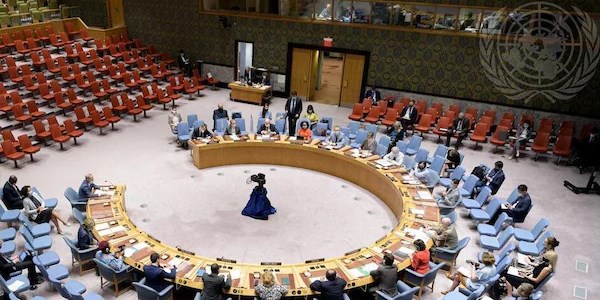Climate Change & UNSC

What was the recent UNSC Resolution about?
- The UNSC presidency for December is held by Niger and it organized a debate titled, ‘Maintenance of international peace and security: security in the context of terrorism and climate change.’
- Niger sought to examine the link between climate change and security risks.
- A draft resolution on climate change was put to vote at the UNSC recently. It sought to authorize the UNSC to deliberate on climate change-related issues.
- This draft resolution was piloted by Ireland and Niger.
- This isn’t the first such attempt to bring climate change into UNSC’s agenda. A similar but stronger resolution was proposed by Germany. This resolution was never put to vote on account of possible objections from the USA.
How did the countries vote on it?
- 12 UNSC members voted in favour or the resolution. However, it didn’t pass as Russia and India voted against it. China abstained from voting.
- With regards to USA, the previous attempt didn’t have much chance of success given the Trump government at the country’s helm. However, with the change in administration, the draft resolution had a realistic chance of success but for the opposition from India and Russia.
- According to the supporters of the resolution, climate change is creating security risks and is expected to exacerbate with the destruction of livelihoods, water shortage and worrying migration patterns.
- According to its opponents, the UNSC’s responsibility is maintenance of international peace and security– not climate change.
Why did India cast a negative vote?
- India cast a negative vote, stating that the resolution is an attempt to shift climate discussion from the UNFCCC to UNSC.
- India’s Permanent Representative and Ambassador to UN questioned if this draft resolution could achieve what the UNFCCC process couldn’t.
- It held that the resolution is a ‘step backward’ for collective climate action i.e. taking climate talks to the UNSC would mean that decisions would be taken without consensus and without the involvement of many developing countries.
- The ambassador held that the resolution would undermine the progress made at the COP26 of UNFCCC at Glasgow recently. It may lead to just a few countries deciding on all climate-related issues.
- The ambassador accused the developed countries of trying to evade responsibility by shifting climate talks to the Security Council forum.
- He also held that viewing conflict through the climate change prism is misleading and is an oversimplification which would only worsen, instead of solving, the conflicts.
What is the way ahead?
- India’s negative vote is a reflection of its long-held opposition to attempts to expand the UNSC mandate to other areas that are already under the purview of other forums.
- The urgency for taking climate action is worth appreciating, but securitizing the climate agenda may lead to unintended consequences such as giving more power to the industrialized nations at the expense of the developing world.
- All matters related to climate change are being dealt with by the UNFCCC. It is a specialized agency with more than 190 members. Some of its achievements include the Kyoto Protocol, the 2015 Paris Agreement and the recent Glasgow Summit.
- It is true that the decision making process at the UNFCCC is slow and there is a need for expedited action to tackle climate change. However, the outsourcing the decision making to the 5 permanent members of the UNSC isn’t the solution.
- It is misleading to look at security through the climate change prism. Each country faces a different set of challenges in moving to a greener economy. Meanwhile, developed countries haven’t met their promises regarding climate action.
- The Global South needs to be encouraged with financial assistance.
- The UNFCCC’s scope could be expanded to cover climate-related security issues.
Conclusion:
Climate action must be a collective process and the UNFCCC is the best forum for this as decision is by consensus.
Referred Sources
If you like this post, please share your feedback in the comments section below so that we will upload more posts like this.

